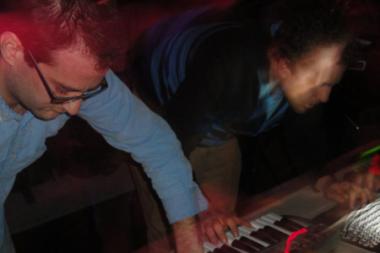“I have hundreds of cheap little musical toys, drum machines, and Casio keyboards in my lab, waiting to be sampled and mangled and sampled again,” says Noam Schatz of Northampton band LOLFM, referring to the array of noise-making tools at the ready in his home’s attic studio.
Schatz is something of an authority on the subject, even building a small synthesizer for the Beastie Boys’ Ad-Rock, which featured on the track “Too Many Rappers.”
After his previous outfit—the popular Mobius Band—broke up, Schatz teamed up with longtime friend Aaron Rubinstein to continue his musical endeavors. The core of LOLFM is Schatz on keyboards and “the maze in his computer”—beats, bass, samples and the like—and Rubinstein on guitar and synth. (Synth box manipulator Eric Hnatow is on hiatus as he returns to school and focuses on other musical projects.)
During his previous band’s run, Schatz became interested in circuit bending—the art of purposefully short circuiting and modifying musical toys and instruments—which led him to become more involved in listening to and creating electronic music.
After Mobius disbanded, he started getting together with Rubinstein, whom he originally met at summer camp when the two were kids, to make sounds with Schatz’ collection of noisemakers.
The duo draws inspiration and concepts from all sorts of music, from pre-war blues and ’60s avant garde to funk and soul, but places its sound squarely in the “German school” of Krautrock and electronic artists like NEU!, Can, Harmonia, Kraftwerk, and Schlammpeitziger.
Add to that contemporary electronic musicians like Fourtet, The Books, and Matmos, along with a smattering of Shibuya-kei Japanese pop artists like Yellow Magic Orchestra, Cornelius, and Sketch Show, and you’ve got a great idea of where LOLFM is coming from and where it might be heading.
The band’s songs are built by piling up sounds, and by deftly mixing man and machine. “Our more recent music has been composed with a laptop at the center, which really opens up an infinite world of possibilities,” says Schatz. “The computer can do as much or as little as you ask of it, and we’re working now to try and find the balance between pre-programmed and live performance. But somewhere in that interplay between us and the machine, some very interesting things have been happening. I’ve always liked that we have some parts that are sequenced and highly regular mixed with parts played with the fallible hand of humans. This tension between the perfect and imperfect helps to keep ears captivated.
“Mostly we just like to play with sound, layering lots of interesting beats, textures, samples, and guitar and synth lines into a thick stew.”
LOLFM has one record, We Are Its Waves, available as a free download on the group’s Bandcamp site. You can also grab a copy with hand-screened track card and artwork for five dollars at shows.
The band is currently working on new material with an eye toward making another record in the near future, but it’s always more about process than product. “With electronic music, the line between performing, composing, and recording is immaterial,” Schatz explains. “So we already have a good bit of it underway just through the process of writing and playing. We’ve also really enjoyed the handful of live shows we’ve played, and look forward to getting our performances better and better.”
For info, visit www.myspace.com/lolfm. For We Are Its Waves, head to http://lolfm.bandcamp.com.



